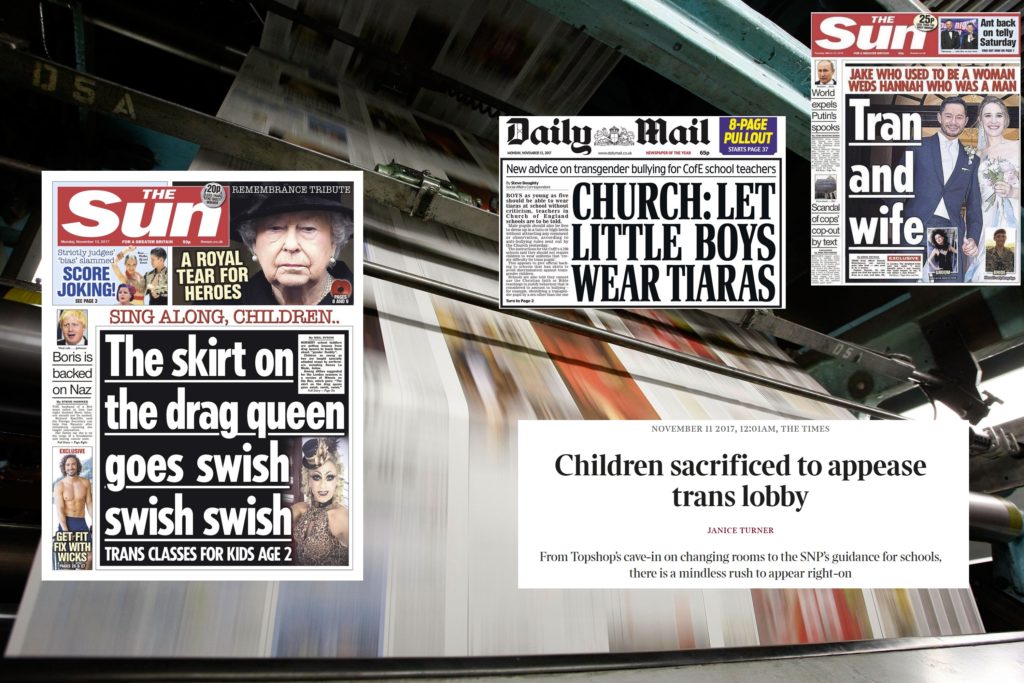Relentless anti-trans media is causing depression and psychological distress among trans people, study confirms

British newspapers have generated an endless stream of anti-transgender coverage over the past few years. (Getty)
Trans people who are routinely barraged with anti-transgender media coverage are more likely to experience depression and negative mental health outcomes, a study has found.
Researchers from the The Fenway Institute and Brown University asked 545 participants about their experiences of anti-trans messaging and their mental health.
The study, published in the LGBT Health journal, found that 97.6 per cent of participants reported seeing negative depictions of transgender people in the media in the past 12 months – 93.9 per cent seeing anti-trans coverage in print, 93.8 per cent on television and 83.1 per cent in advertising.
Exposure to anti-transgender messaging was found to correlate strongly with reports of depression, anxiety and psychological distress.
People who are frequently exposed to transphobic media were found to be 18 per cent more likely to be depressed and 28 per cent more likely to experience psychological distress, even when adjusted for other factors.
Anti-trans media coverage is fuelling negative mental health impacts.
Jaclyn White Hughto, assistant professor at Brown University School of Public Health, said: “Nearly all of our study participants reported having seen negative depictions of transgender people in media over the past 12 months.
“But those who reported greater frequency of exposure to these messages were significantly more likely to exhibit clinical symptoms of depression, anxiety, global psychological distress and PTSD.
“The association held even after adjustments were made for variables such as age, race, income and reported experiences of childhood and/or adult sexual or physical abuse, which suggests that negative media messages may have an independent impact on the mental health of transgender populations exposed to such messages.”

British newspapers have generated an endless stream of anti-transgender coverage over the past few years (Getty)
Hughto added: “Given the prevalence of systemic discrimination against transgender people in employment, health care settings, schools, and housing, we have long known that structural interventions are required to target stigma at its source.
“Campaigns designed to encourage accurate, non-stigmatizing depictions of transgender people across all media could serve to mitigate the harms of negative media messages to transgender people.
“In the meantime, clinical interventions can also help transgender people cope with the stress of being exposed to negative transgender-related media.”
In the UK, the impact of relentless anti-trans messages has been devastating.
The US-based study affirms anecdotal reports from the UK, where a years-long blitz of anti-transgender stories in the media has led to rising demand for mental health and support services for trans people.
Earlier this month, a report from LGBT+ anti-violence charity Galop found that as a result of transphobia, more than half of transgender people in the UK feel less able to go outside and two-thirds say they avoid using public bathrooms.
One respondent said: “The fear is particularly prevalent when public figures – politicians, high profile newspaper columnists etc – demonise trans people in print or on air; it makes the fear more pronounced because you worry someone’s going to act on it.”
Leni Morris, CEO of Galop, said that the report showed the reality of life for British trans people amid increasingly hostile debate about trans rights and toxic, transphobic commentary in the media.
“As the whole LGBT+ community knows from our history, there are real-world consequences to public debates,” Morris said. “Our new report shows how the safety and dignity of trans people is currently at risk.”

